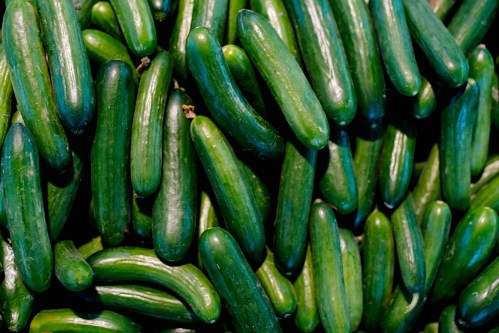Heads Up: There’s Another Massive Cucumber Recall Happening Right Now
The warm weather food staple was just hit with another multi-state recall ahead of the summer months.

Update 5/27/25:
This recall has expanded to include more cucumber products from companies like Kroger, Walmart, and Publix. So far, all cucumbers that have been flagged for this salmonella outbreak can still be traced to the Florida-based farm: Bedner Growers, Inc.
- PennRose Farms has recalled their five-pound mesh bagged cucumbers, according to a statement. These cucumbers were distributed to Restaurant Depot locations in OH, FL, GA, IL, and NJ.
- Walmarts in Texas have recalled their "Marketside Fresh Cut Cucumber Slices," due to salmonella presence concerns, according to the FDA.
- Ukrop Homestyle Foods recalled a marinated cucumber salad sold at the following stores:
- JFE Franchising, Inc. (Kroger, Roundy's, and Weis Market) has recalled over 30 cucumber-based products (full list here) in the following stores and locations, according to the FDA:
Previous 5/20/25:
The Food and Drug Administration (FDA) has issued a multi-state recall of cucumbers grown by Bedner Growers, Inc., and distributed by Fresh Start Produce Sales, Inc. due to a salmonella outbreak. So far 26 people have gotten sick from the recalled cucumbers.
The cucumbers were distributed to restaurants and stores, and the FDA is “working to determine” more accurately where they may have been distributed, the agency says in the recall notice.
There have been several recent recalls linked to cucumbers. Last winter, several brands pulled cucumbers from stores across the country over salmonella concerns. And, in June 2024, Bedner Growers, Inc.—which is involved in this outbreak—was linked to an outbreak of Salmonella Africana and Salmonella Braenderup infections, with 551 illnesses reported across 34 states and the District of Columbia. As of August 22, 2024, that outbreak was considered over.
Here’s what you need to know about the latest cucumber recall, plus why it’s so potentially dangerous.
What is the cucumber recall?
The cucumber recall impacts cucumbers grown by Bedner Growers, Inc., in Boynton Beach, Florida, and distributed by Fresh Start Produce Sales, Inc., of Delray, Florida. The FDA and Centers for Disease Control and Prevention (CDC) are investigating an outbreak of Salmonella Montevideo infections tied to these cucumbers.
As of the latest update, 26 people have gotten sick and nine have been hospitalized. Of the 13 people who were interviewed, 11 out of the 13 reported eating cucumbers, per the recall notice.
In April, FDA investigators collected an environmental sample from Bedner Growers, Inc. during a follow-up inspection from last year’s outbreak. It was positive for Salmonella and matched recent samples from people who were sick
People have gotten sick in these states:
- Alabama
- California
- Colorado
- Florida
- Illinois
- Kansas
- Kentucky
- Michigan
- New York
- North Carolina
- Ohio
- Pennsylvania
- South Carolina
- Tennessee
- Virginia
The cucumbers were distributed to retailers, distribution centers, wholesalers, and food service distributors from April 29, 2025 to now, according to the recall notice. They may have been sold individually or in smaller packages, with or without a label that may include the same brand, product name, or best by date.
The FDA’s investigation is ongoing, according to the recall notice.
What makes this recall dangerous?
The recall and outbreak is due to salmonella, the leading cause of foodborne illness in the U.S. Salmonella sickens about 1.35 million people in the country every year, leading to 12,000 hospitalizations and 238 deaths, according to CDC data.
Symptoms of these illnesses can start anywhere from six hours to six days after someone has been infected. The most common symptoms are watery diarrhea that may have blood or mucus, along with stomach cramps, per the CDC. However, some people may also have headaches, nausea, vomiting, and loss of appetite. Symptoms can last a week.
In some cases, people with a salmonella infection can develop severe illness like blood and brain infections.
How does salmonella end up in cucumbers?
There are a few different ways cucumbers can end up contaminated with salmonella, according to Benjamin Chapman, Ph.D., food safety expert and department head of Agricultural and Human Sciences at North Carolina State University. “Anything the cucumbers come in contact with can lead to introducing bacteria or viruses onto the surface of the product,” he says.
Cucumbers can be contaminated in the field by things like irrigation or spray water, and they also may be contaminated by animals or flood events that happen. “In packing, things like sorting tables or hands can also be a source of contamination,” Dr. Chapman says.
While cucumbers have been involved in several recent recalls, Chapman points out that this isn’t just a cucumber issue. “Contamination of fresh produce is something that the industry and regulators are always concerned about,” he says. “Contamination can—and has—popped up with many produce products.”
Cucumbers are usually considered a “moderate” risk produce, according to Janet Buffer, M.P.H., senior institute manager for the Institute for Food Safety and Nutrition Security at George Washington University. “In my years as a food safety expert, cucumbers were historically considered low-risk,” she says. “All raw produce now carries some level of contamination risk due to agricultural water, soil, processing, handling, and transportation practices.”
What to do if you have the recalled cucumbers at home
It can be hard to know if you have one of the recalled cucumbers at home, given that many of these may not be labeled. That’s why the FDA recommends throwing your cucumbers away if you can’t tell if they were grown by Bedner Growers. It’s also important to be wary when eating out. “When eating out over the next week, ask if cucumbers were from Bedner Growers or Fresh Start Produce Sales, Inc.,” the recall notice reads.
If you purchased a recalled cucumber or suspect that you may have gotten one, the FDA recommends throwing it away and carefully cleaning and sanitizing any surfaces the cucumbers may have touched. If you become sick after eating cucumbers, the FDA recommends contacting your healthcare provider.










